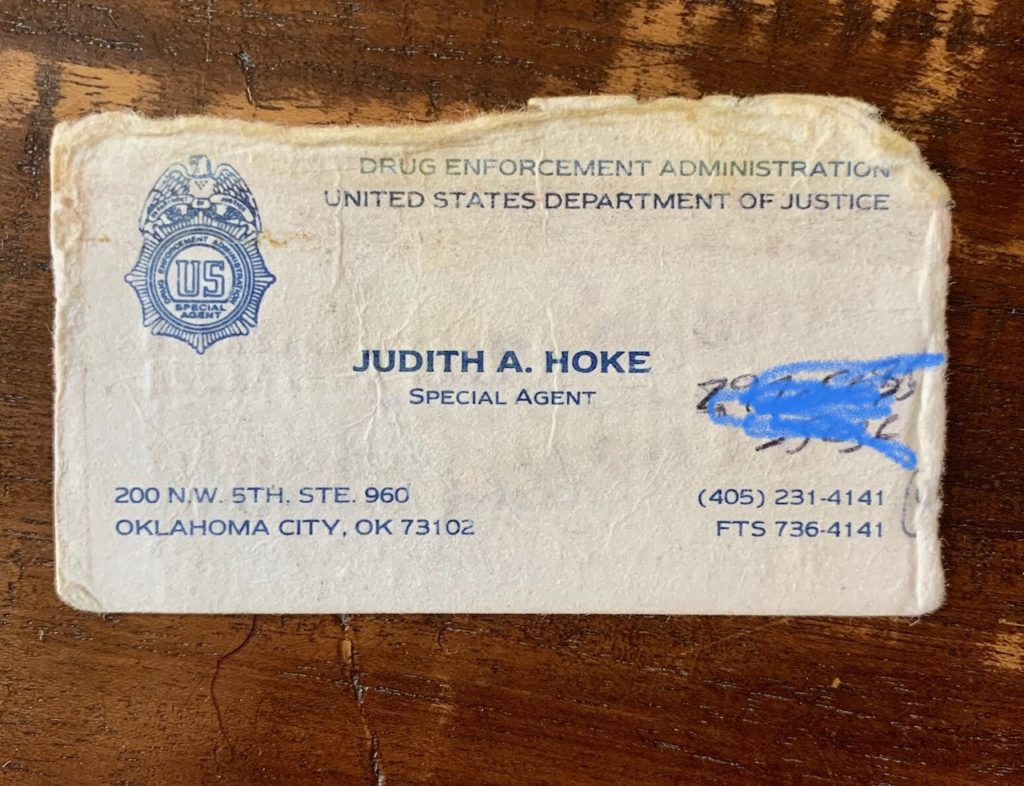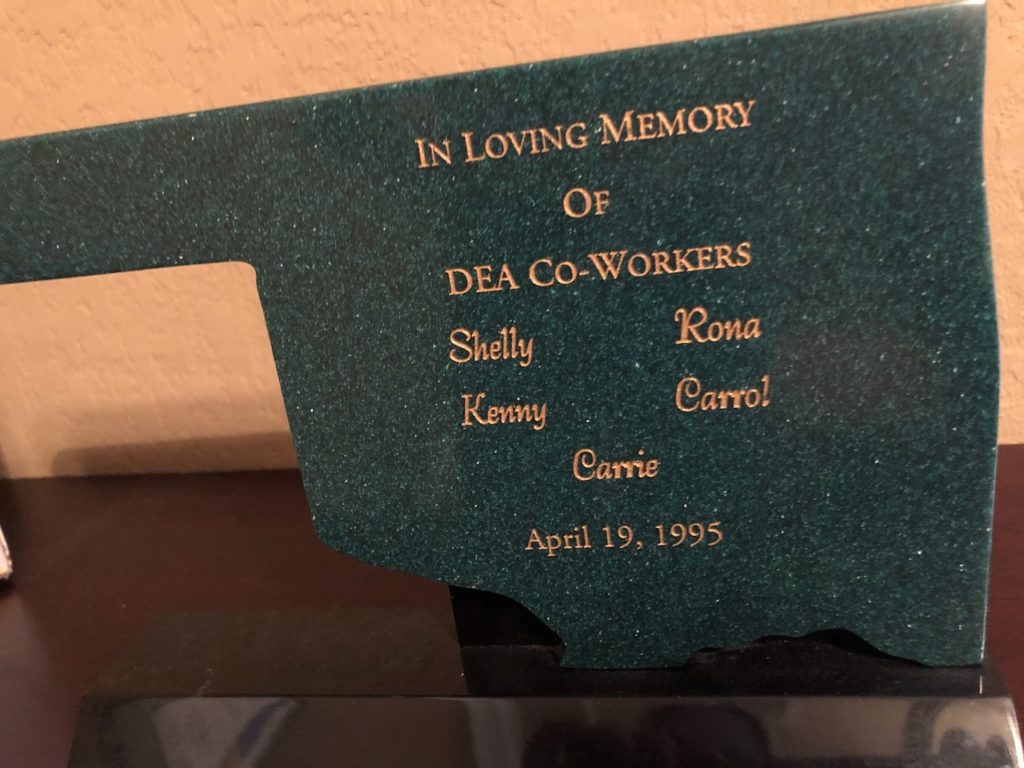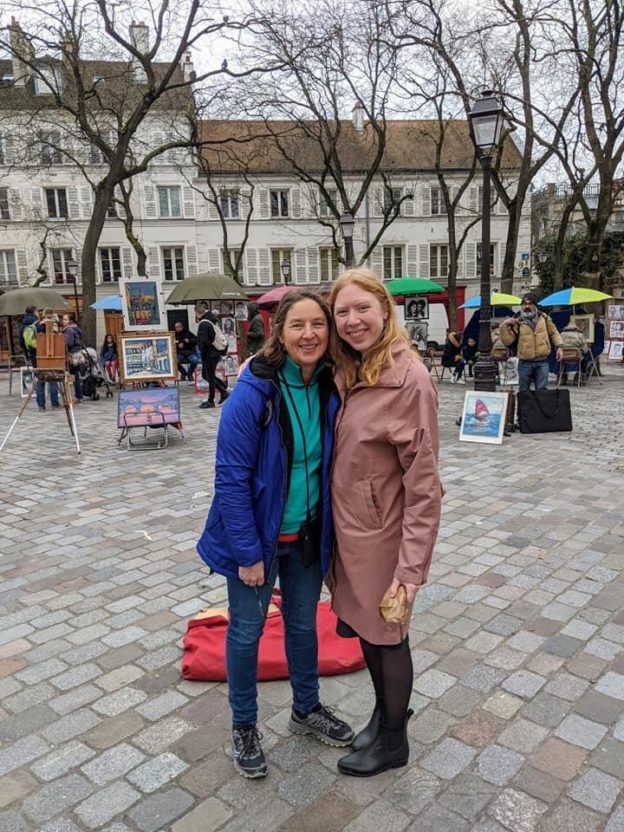
April 19, 1995 Oklahoma City, Ok Photo: Ruthie Graphic Artwork: Emma Gulitti
I sure welcome any opportunity to honor my dearest friends and colleagues who perished April 19, 1995 in the bombing of the Oklahoma City Federal Building. From my office alone, we lost Carrol, Kenny, Shelly, Rona, Carrie, and Carrie’s unborn son. I welcome the opportunity to help educate upcoming generations about this event so that we might never forget. But in order to make a difference, talking about it now — 25 years later — has to be more than just a recitation of facts about those who died and those who survived. Five years ago I wrote an article entitled “The Why and the What of April 19, 1995.” And now, on this anniversary, I think there needs to be a dialogue about how that survival spurred us forward with hope and healing not just for ourselves, but also for others. We have to loosen the death grip we have on the death of our loved ones, in order to lay hold an even stronger grip on living. We do that by helping others survive their own tragedies — be it betrayal, loss, divorce, financial ruin, a terrorist attack, coronavirus, or criminal violence. For me, I believe that I honor my belated friends every single time I choose to step into another person’s difficult journey.
Initially, surviving typically encompasses enormous amounts of unfathomable pain, both physical and mental. Events like the bombing of the OKC federal building, 9/11, divorce, death of a loved one, loss of a job, or family hardship, are no discriminator of persons. Adults, children, women, men, daughters, sons, wives, and husbands. Hardship has a name, and it’s yours. Tragedy has been churning out victims since the creation of man. But whether you become a survivor or a casualty of that tragedy, is completely up to you. So how do we navigate that choice? No one wants to be held captive by their pain. Everyone that I know desires a life that has purpose and meaning and joy. I would gently submit this for consideration: The less time we spend focusing on the lives of others who might need our insight, the more time we spend in that perpetual and painful place of surviving, rather than thriving! Pitching our tent in this place effectively disables us from helping a single other soul, because after all — day after day, month after month, and year after year — you are just trying to keep your own head above the crashing waves.
The morning of April 19, 1995, I was just shy of 30 years old, still a newlywed, and crazy abut my job as a Federal Agent with the Drug Enforcement Administration (DEA). That morning, my job started out with no surprises. I had worked late in my 9th-floor office of the Alfred P. Murrah Federal Building the night before and left around 8 p.m. Apparently, several of my co-workers had been out even later than me. Like me, they returned to the office, tidied up their case work, locked up, and left for home. I was back early the next morning and parked my car in the underground garage directly below the building. This garage linked the federal building to the federal courthouse via a tunnel. The tunnel extended several blocks south of the courthouse as well.
Out of habit, I walked into the federal building and headed straight to the elevator, intending to go up to my office. It was around 8:30 in the morning. I punched the up arrow, and then remembered I had everything I needed in my brief case for a meeting with the Assistant United States Attorney (AUSA) about four blocks south of my building. I swiftly turned around, reentered the garage, and walked the four blocks via the underground tunnel. I was there in the AUSA’s office about 30 minutes later, when the bomb exploded at 200 NW 5th Street at approximately 9:02 AM, killing 168 innocent men, women, and children — including 5 of my best friends from my office, 2 of my colleagues from US customs and 7 from the US Secret Service, and another 154 people, such as the children in the daycare center on the 2nd floor and the employees of Federal Employees Credit Union on the 3rd floor, whose faces I had grown to love.
The building I was in on Park Avenue shook, and one of the administrative assistants came into the office where I was standing with the AUSA. She said these words which are forever etched in my mind: “It’s the Alfred P. Murrah building.” I was stunned. “That’s my building, and I’m four blocks away.” I immediately tried to call my office, but the phone just rang — no answer. I left a message on my home answering machine for my husband. I also left a message with his squadron at Tinker Air Force Base, thinking he would certainly get the message at one of those two places.
Then I just ran.
The truth is when tragedy hits us, we all run! The question is do we run toward the fight or away from it? We all know the basics about the “fight or flight” phenomenon. Essentially, it is a combination of many emotional and physiological reactions to stress. It basically evolved as a survival mechanism, enabling people (and other mammals) to react quickly to life-threatening situations. The end result is to fight the threat or flee to safety.
What I am suggesting, is if you are entrenched in surviving mode and not thriver mode, that maybe you need to run toward the fight. Maybe you chose flight at the outset, which is okay. Sometimes we just have to retreat from the battle and from that overwhelming sense of loss. This world inflicts deeper wounds than what our individual skill sets alone can reconcile. But we can ask for help. And with that, we can run to the fight. Because if you never wrestle with your loss, you will never get to survival. You will be stuck in surviving. Then when you do encounter someone else who is facing their own decision to fight or flight, you will not be able to help them. And that itself deepens the wounds that are festering inside of you.
So I ran. I ran headlong into the chaos, four blocks to my building. What I saw when I got there was one of my worst nightmares. My desk sat on the north glass of the 9th floor, which would turn out to be the blast side. At least that was where it used to be. No one — and I mean no one — ever expects to get up on a “normal” morning and discover their place of employment has been bombed by a demented, domestic terrorist. Likewise, it is in no one’s — and I mean no one’s — life plan to have to deal with the consequences of divorce, betrayal, disease, personal disappointment, loss of a child….
But we have a choice.
We can run headlong into our struggle or away from it.
There is a remarkable painting which adorns one wall of a chapel just inside the Cathedral St Sulpice, located in the 6th arrondissement of Paris, France. An original Eugene Delacroix from the mid-19th century, it is an excellent depiction of Genesis 32:24-30 where a battle-scarred and travel-weary Jacob wrestled with God in a determined effort to receive a blessing. Ostensibly, in one agonizing moment, he chose fight over flight. Verse 28 says “Then the Man said ‘Your name will no longer be Jacob, but Israel, because you have struggled with God and with humans and have overcome.”
Jacob chose the fight, and received a blessing when he did. The rest of his life wasn’t always easy (just keep reading). But, in that very moment when he chose to wrestle, he became the father of a great nation — the father of Israel. He became an overcomer. Indeed, he was so overwhelmed with the blessing he received, the next morning he named the place where he wrestled with God, Peniel, meaning the face of God. Clearly, he never wanted to forget his own moment of reckoning with his pain.
If you and I are going to be survivors; if we are ever going to be able to lead someone else forward out of their pain; then maybe, just maybe we need to run to the fight. Maybe we need to wrestle with our worst fears and when we’re done, give it a name. Peniel. Triumphant. Overcomer. Healed. Whole. Forgiven. Hopeful. Undaunted. New. Faithful.
I’ll say it again: bombing, divorce, betrayal, abuse, devastating loss — whatever life trauma has beset you. Survival must eventually be the conclusion of surviving. At some point, we have to move from a place of pain to a place of healing. And then from a place of healing to a place of influence. I want someone who’s hurting to look at me and say “If she can do that, then so can I.”
A sweet friend of mine went through a very difficult divorce almost two decades ago. I was doing life and work with her when that happened. Fast forward, about a year ago, she sent me a message that said: “Judy!!! I don’t know if you remember that card you gave me after my heartbreak … ‘take a step back and look at things a different way’ … but I have always used that!!!!” I was blown away, and cried when I read it. She was a survivor. And in some small way, I had unwittingly helped her get there. But clearly only because I had moved from a place of pain to a place of healing myself. I know that if Carrol, Kenny, Shelly, Carrie, or Rona were able to tell us something on this 25th anniversary of their death, the 25th anniversary of the Oklahoma City Federal Building bombing, they would say, “It’s time to emerge from the rubble of the tragic events of your life. Someone else needs you. Someone else is cemented in their pain. And your story of survival might just be what they need to hear!”



